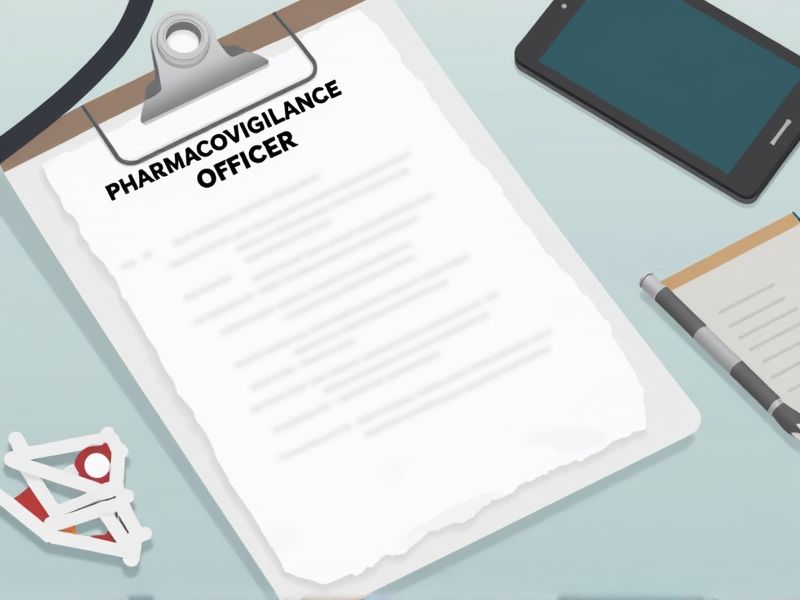
Pharmacovigilance officers play a crucial role in monitoring the safety of pharmaceutical products, making specific certifications essential for ensuring their competence and effectiveness in this domain. These certifications provide officers with specialized knowledge in detecting, assessing, and preventing adverse drug reactions. They serve to standardize practices, ensuring that pharmacovigilance professionals meet regulatory and industry standards. Here are crucial certifications needed for a Pharmacovigilance officer.
Certified Pharmacovigilance Professional (CPP)
The demand for a Certified Pharmacovigilance Professional (CPP) credential arises from the critical need to ensure drug safety and effective risk management in the pharmaceutical industry. This certification provides pharmacovigilance officers with comprehensive knowledge of regulatory requirements and best practices, which aids in identifying, assessing, and mitigating adverse drug reactions. By obtaining a CPP certification, officers enhance their credibility and demonstrate a commitment to maintaining high standards in drug surveillance. This leads to improved trust from stakeholders and ultimately contributes to public health and safety.
Drug Safety and Pharmacovigilance Certification (DSPC)
The Drug Safety and Pharmacovigilance Certification (DSPC) provides essential validation of a pharmacovigilance officer's expertise in monitoring and evaluating drug safety. Possessing this certification can enhance an officer's ability to detect, assess, and report adverse drug reactions effectively. It ensures that the professional remains updated with the latest regulatory requirements and industry standards. Organizations employ certified individuals to mitigate risks associated with drug approvals and maintain public health safety.
Good Pharmacovigilance Practices (GVP) Training Certification
Good Pharmacovigilance Practices (GVP) Training Certification is essential for a Pharmacovigilance officer because it ensures they adhere to international safety standards, reducing the risk of non-compliance. This certification enhances their ability to effectively monitor and report adverse drug reactions, which is crucial for patient safety. It also demonstrates a commitment to maintaining up-to-date knowledge in an ever-evolving regulatory environment. By obtaining this certification, officers can improve communication with healthcare professionals, authorities, and other stakeholders, ensuring more efficient collaboration.
EU Good Vigilance Practices (EU-GVP) Certification
Obtaining EU Good Vigilance Practices (EU-GVP) Certification equips a pharmacovigilance officer with a comprehensive understanding of European regulatory standards, ensuring compliance and enhancing drug safety monitoring. Adhering to these guidelines helps in the early detection of adverse drug reactions, which can prevent potential harm to patients and mitigate legal risks for pharmaceutical companies. Certification ensures a standardized approach to handling drug safety data, facilitating efficient communication between industry stakeholders and regulatory bodies. Possession of EU-GVP Certification may increase career prospects by demonstrating a commitment to high safety standards and proficiency in pharmacovigilance practices.
FDA Pharmacovigilance Training Certification
The FDA Pharmacovigilance Training Certification equips a pharmacovigilance officer with the regulatory knowledge necessary to identify and report adverse drug reactions effectively. This certification ensures compliance with FDA regulations, minimizing the risk of non-compliance and potential legal consequences. By understanding FDA standards, pharmacovigilance officers can enhance the safety monitoring process, contributing to improved public health outcomes. The certification also signifies a level of expertise that can increase credibility and trust with stakeholders in the pharmaceutical industry.
Global Pharmacovigilance and Drug Safety Certification (GPDSC)
Pharmacovigilance officers need the Global Pharmacovigilance and Drug Safety Certification (GPDSC) because it provides a standardized framework for monitoring drug safety. This certification ensures that officers are equipped with up-to-date knowledge on adverse drug reaction reporting systems and regulations. The GPDSC enhances the credibility and professional competency of officers, making them more effective in safeguarding public health. With a formal certification, employers and regulatory bodies gain confidence in the officer's ability to manage drug safety effectively.
Regulatory Affairs Certification (RAC)
RAC certification validates a pharmacovigilance officer's understanding of regulatory guidelines, which is crucial for ensuring drug safety compliance. It enhances credibility and trust with stakeholders by demonstrating up-to-date knowledge of industry standards and processes. Having RAC certification improves the ability to navigate complex regulatory environments, leading to more effective risk management and decision-making. This certification often increases career advancement opportunities and can impact salary positively due to the specialized expertise gained.
Certified Clinical Research Professional (CCRP)
Pharmacovigilance officers are tasked with monitoring and assessing drug safety, which requires a solid understanding of clinical research methods. Holding a Certified Clinical Research Professional (CCRP) credential signifies a mastery of these essential skills, therefore enhancing the officer's ability to perform comprehensive safety evaluations. Regulations around drug safety are stringent, and the CCRP ensures that professionals are well-equipped to adhere to these standards. Employers often seek CCRP-certified individuals to ensure proficiency in managing and analyzing clinical data effectively.
Advanced Certificate in Pharmacovigilance and Pharmacoepidemiology (ACPPE)
An Advanced Certificate in Pharmacovigilance and Pharmacoepidemiology equips a pharmacovigilance officer with specialized knowledge to effectively monitor and evaluate drug safety. Improved understanding of adverse drug reactions leads to enhanced risk management and overall patient safety. Comprehensive training in pharmacoepidemiology allows for better data analysis, aiding in the identification of potential drug-related public health issues. Employers value certifications, which can boost career advancement opportunities and professional credibility.
Project Management Professional (PMP)
Pharmacovigilance officers juggle multiple projects simultaneously, and PMP certification enhances their ability to manage these complex tasks effectively. With PMP skills, these professionals can better align their projects with strategic objectives, ensuring compliance with regulatory requirements. The rigor of PMP training equips pharmacovigilance officers to identify potential risks early in drug safety projects, mitigating them before they become issues. PMP credentials can elevate a pharmacovigilance officer's credibility, providing a competitive advantage in the field.
Summary
When pursuing certifications in pharmacovigilance, you enhance your professional credibility in the field. This often leads to greater recognition and potential advancement opportunities within your organization. With additional expertise, you contribute more effectively to ensuring drug safety and minimizing adverse effects. This proficiency can also attract better career prospects and broaden your professional network.
